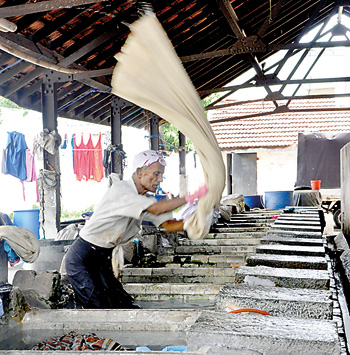News
This land belongs to us say washer families facing eviction
View(s):By Tharooshie Mahahewage
Traditional washer families evicted from a plot of land in Colombo have failed to make the Rs. 50,000 deposit demanded by the Urban Development Authority (UDA) for each new workspace being built for them in a separate location, a spokesman said. “The deadline for payment was March 12 but none of these families can afford that amount of money,” said Mr. Mahadevan, who goes by one name. The UDA has served eviction notices on the settlement, causing angry protests from impoverished families who claim to have lived there for nearly one hundred years.

Line after line of clothes blowing in the wind. Pic by Indika Handuwala
The settlement is located at Perahera Mawatha near Gangarama Temple in Colombo 2. Lines of pearly white clothes drying in the sun alert passersby to their presence. The families say they have lived there since 1928, when British colonial rulers allocated them the land. Now, they will be shifted en masse under the UDA’s ‘Relocation of Traditional Economic Activities’ project. UDA officials said the new site will be equipped with all necessary facilities. But the washer community opposes the move. One reason is because they will not receive alternative homes for the ones they are losing. Mr. Mahadevan lives in the community. Although he is not a washer, he speaks on their behalf. “Some people have been born in this place,” he said. “Ownership has been handed over from father to son and so on. They have been here all their lives and are entitled to be owners.”
The families are in receipt of letters from the UDA stating the land is to be acquired. Mr. Mahadevan said the authorities would build a car park there. They have been informed that washing facilities will be set up on a property near Nawam Mawatha. The UDA’s Deputy Director of Projects Anusha Liyanamanne said the Perahera Mawatha land had not been allocated to the washer community to build homes on. “According to the Colombo Municipal Council, these lands were given only so they could practice their trade,” she explained. “Not to live. It is now that they have built small rooms to live in along with their families. They all have houses elsewhere.”
But one dweller said 15 families live in the settlement. Each had between four and five children. “Some families have rooms,” he explained. “Those who don’t, share with others. There are roughly two families living in one room.”
The Sunday Times visited a house, for which the inhabitants pay Rs.11.25 a month. It is a small room of about 6×7 feet. It houses the family’s meagre possessions including cooking utensils. The adults sleep on the floor and the children on a wooden platform fixed to the wall.
“If they live at that location, why didn’t they tell us before?” Mrs. Liyanamanne said. “We had meetings with them before taking decisions.”
The families are also protesting against being told to pay money for workspace at the new location. To reserve a small room, a payment of Rs. 50,000 must be paid before a deadline. They will thereafter be charged Rs. 5,000 per month in addition to electricity and water bills. “This is very unfair,” said 32-year-old Dinusha, who lives there with her husband and three young children. “If we can afford to pay Rs. 50,000 at short notice, we wouldn’t be living in shanties and doing this job in the first place.”
Mrs. Liyanamanne said the UDA has so far spent Rs. 680,000 on the project. “When we started, we told them they would have to contribute some money towards it,” she revealed. “They were happy to do so. Why this sudden change? We only ask for a small sum, Rs. 5,000. The Rs. 50,000 as a connection fee. Can you even use a public toilet for Rs. 11 these days?”
The washer community says their income is significantly lower when compared with the past. “Nobody asks our side of the story,” complained Mr. Mahadevan. “The President recently said he will help us and will renovate this place. That’s not what the UDA is telling us. We don’t think the President knows about this injustice.”
Follow @timesonlinelk
comments powered by Disqus



















